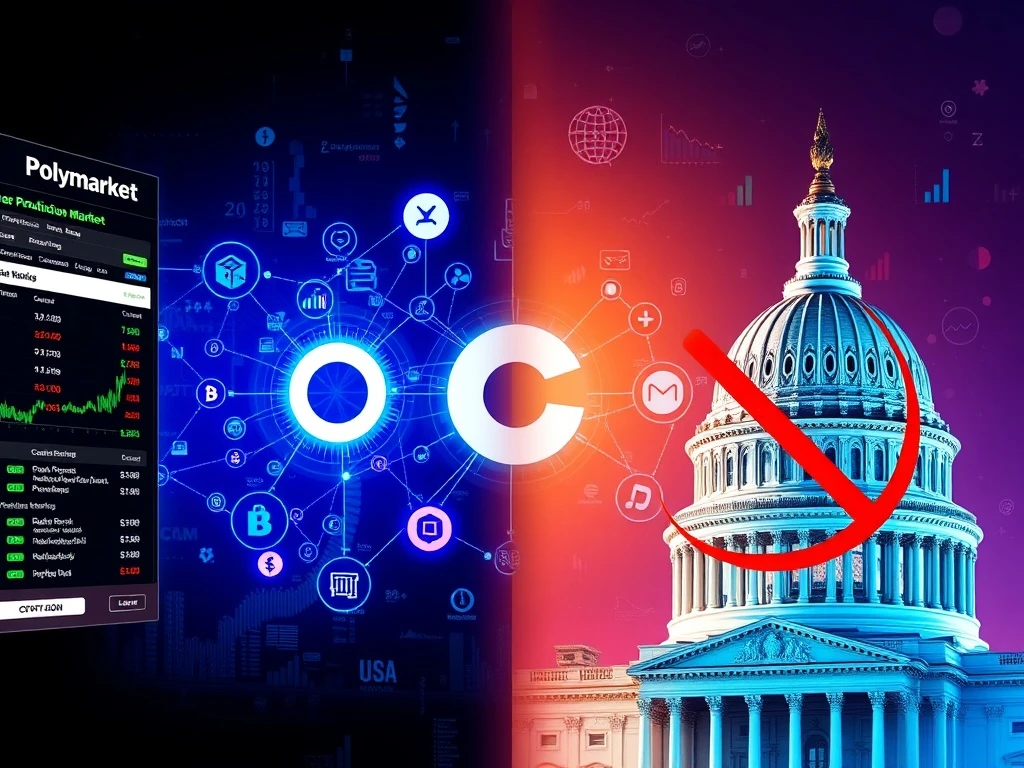Crypto News: Unveiling Crucial Daily Developments

Today’s crypto news brings forth several pivotal developments shaping the digital asset landscape. From major platforms expanding their reach to significant regulatory discussions, the industry remains dynamic. Investors, enthusiasts, and policymakers are closely watching these events. This daily digest offers crucial insights into the forces impacting Bitcoin price, blockchain innovation, DeFi, NFTs, Web3, and evolving crypto regulation.
Polymarket Eyes Ambitious US Relaunch
Prediction platform Polymarket is reportedly preparing for a significant Polymarket US relaunch within weeks. According to a recent Bloomberg report, citing informed sources, Polymarket plans to offer limited trading services to US residents. Initially, the focus will be on sports betting, with a target launch before the end of November.
This anticipated relaunch follows a crucial development two months prior. The US Commodity Futures Trading Commission (CFTC) issued a no-action letter to a crypto derivatives exchange and clearinghouse. Polymarket had acquired this entity, clearing a path for its US operations. CEO Shayne Coplan confirmed this move, stating it set the stage for the company to “go live in the USA.”
Reports from September indicated substantial market confidence. If Polymarket successfully reopens to US markets, its valuation could potentially reach $10 billion. As of June, the platform held a valuation of approximately $1 billion, secured after a $200-million funding round. Currently, Polymarket’s website displays a waitlist, informing users it will “soon be available for US traders.” This expansion marks a significant step for prediction markets in the regulated US environment.
Circle Debuts Arc Blockchain Testnet with Industry Giants
Circle, a leading stablecoin issuer, has officially launched the public testnet for Arc. This open layer-1 Circle Arc blockchain network aims to integrate global financial infrastructure on-chain. Circle refers to Arc as the “Economic Operating System for the internet.” The rollout features participation from over 100 major institutions, spanning banking, capital markets, and fintech sectors. These include prominent names like BlackRock, Goldman Sachs, Visa, Mastercard, and State Street, as announced recently.
Jeremy Allaire, Circle’s CEO, expressed enthusiasm for Arc’s early momentum. “Leading companies, protocols, and projects are already building and testing,” he noted. These participating companies collectively reach billions of users. They also move, exchange, and custody hundreds of trillions in assets and payments annually. This broad engagement highlights Arc’s potential impact.
Arc offers several key features designed for institutional use. It provides predictable US dollar-based fees and sub-second transaction finality. Additionally, it includes optional privacy controls. The network directly integrates with Circle’s USDC (USDC) stablecoin and its robust payments stack. This integration supports a wide array of financial applications. These range from lending and capital markets to global payments and foreign exchange (FX) services. The testnet launch has attracted significant interest from institutions such as Apollo, BNY Mellon, Intercontinental Exchange, and Deutsche Bank. Global payment firms like Mastercard, FIS, Paysafe, and Nuvei are also actively involved.

US Lawmaker Pushes for Strict Crypto Regulation
A notable development in Washington D.C. involves a US lawmaker seeking to tighten crypto regulation. US Representative Ro Khanna, a Democratic representative, recently appeared on MSNBC to voice his concerns. He aims to ban US President Donald Trump, his family, and members of Congress from trading crypto or stocks. Khanna highlighted Trump’s perceived conflict of interest with crypto through his son’s project, World Liberty Financial (WLFI). He further alleged that the recent pardoning of Binance co-founder Changpeng “CZ” Zhao constituted “blatant corruption.”
Rep. Khanna did not delve into the specific details of his proposed legislation. However, his message was clear and direct. He concluded his remarks by calling for a ban on “any elected official from having cryptocurrency and accepting foreign money.” This strong stance underscores growing concerns about ethics and transparency in public service regarding digital assets. The proposal reflects a broader push for stricter oversight within the cryptocurrency sector. It suggests that lawmakers are increasingly scrutinizing the financial activities of elected officials.

Analyzing the Impact of a US Lawmaker Crypto Ban Proposal
The proposed US lawmaker crypto ban, championed by Representative Ro Khanna, could have far-reaching implications. Such legislation aims to prevent potential conflicts of interest. It would also enhance public trust in government officials. For the crypto industry, this proposal signals increased scrutiny from legislative bodies. It underscores a growing debate about the role of digital assets in political and financial ethics.
Furthermore, the discussion around Trump’s alleged crypto ties and the CZ pardon brings transparency issues to the forefront. These events fuel calls for greater accountability among public figures. While the specific details of Khanna’s bill are pending, its introduction alone creates ripples. It adds to the ongoing conversation about how best to regulate cryptocurrencies. This proposal could set a precedent for future legislative actions. It might influence how elected officials engage with emerging financial technologies.
Conclusion: A Day of Dynamic Crypto Shifts
Today’s crypto news highlights a dynamic and evolving landscape. We saw Polymarket’s strategic move towards a Polymarket US relaunch, potentially opening new avenues for prediction markets. Circle’s unveiling of the Circle Arc blockchain testnet, with immense institutional backing, signifies a major leap for on-chain financial infrastructure. Concurrently, discussions around crypto regulation intensified as a US lawmaker crypto ban proposal gained traction. These developments collectively underscore the industry’s continuous growth and the increasing attention from regulators and traditional finance. The interplay between innovation and oversight will undoubtedly continue to shape the future of digital assets.







